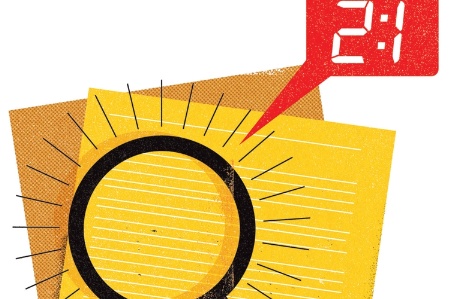The damage contract cheating can inflict on society is clear. Graduates emerge from university with huge (and in some disciplines, potentially dangerous) gaps in their learning and knowledge
Picture the following scenario: marking an essay by one of your more underwhelming students, you grow suspicious. You would like to be pleased by the unexpected quality of the work, but instead you feel “a twinge that a sentence is too neatly framed”, as one scholar who has found herself in this position puts it. The analysis is superb, the writing style good - but is it too good? It bears little resemblance to previous work by the same student: indeed, it is in a different league. But it has been through Turnitin, the academic plagiarism checker, and come back clean. Has the student miraculously improved, or are you looking at a particularly pernicious problem afflicting today’s higher education sector: the paid- for, custom-written essay?
Custom essays, usually bought through websites known as essay mills, are in some ways an academic’s worst nightmare. Unlike standard examples of copy-and-paste plagiarism, they cannot be detected using software because they are “original” pieces of work - just not the student’s. They also arguably represent an even more cynical form of cheating than, for example, regurgitating unattributed passages in a piece of submitted work.
For many years, essay mills have been brazenly advertising their wares online, although they are always careful not to condone customers handing in bought pieces of work, arguing that the essays purchased are intended simply as useful guides or reference material.
No one knows how big the market in custom essays is, or whether universities are managing to detect those students who do hand them in. There are also concerns that in an age of mass higher education and high student-to-staff ratios, lecturers are less able to get to know their students’ work, making this form of cheating more difficult to detect. And there are fears that the pressures of the job might encourage some academics to turn a blind eye to the practice. But perhaps the most important question is whether it is possible to prevent this form of cheating in the first place.
Asking how many custom-written essays are being bought and sold in the UK is a bit like asking “how long is a piece of string?”, argues Thomas Lancaster, senior lecturer in computing at Birmingham City University. For obvious reasons (including the fact that cheats do not want to be caught, essay mills operate online, and there are no official statistics), it is difficult to come by reliable figures.
However, Lancaster, along with his former colleague Robert Clarke, has attempted to quantify the scale of the problem.
The pair studied a large sample of essay mill sites between March 2005 and June 2013, and identified nearly 19,000 attempts at contract cheating by students.
While they examined websites that could be used by anyone anywhere in the world, a more detailed study of 59 postings in 2011 on one website, vworker.com, found 18 references to assignments at UK universities.
“What we detected is the tip of the iceberg,” cautions Lancaster. No one even knows how many essay ghostwriting sites there are on the web, but five years ago Lancaster and Clarke listed 158.
In addition to the online activity, there is an unknown number of essay writers who advertise their work offline - even on campus.
“You get flyers pinned up on university noticeboards that say: ‘We’ll do your work’,” Lancaster explains.
Then there are those who arrange contract essays socially, for friends, family members or students one or two years below them, who leave no public trace at all.
Prices vary dramatically. An upper-second, five-page undergraduate history essay will set you back £70 at the cheaper end of the market, but some sites charge in the region of £150-£160. One website, which sells itself as a “premier” service, charges £50 an hour. This may sound expensive, but it is loose change compared with the cost (particularly for international students) of having to retake a year.
At the top end of the scale, postgraduate dissertations of 25,000 words cost in the region of £2,800.
Some essay writing companies are willing to provide more specific estimates of the scale of demand for their services, although the figures are self-reported and some academics say that the firms may exaggerate their popularity to attract publicity and gain more custom.
Jennifer Wiss, business development manager at All Answers (which trades under a number of names on the web, including UKessays.com), says that the company dispatched 11,470 custom essays in 2012, of which three-quarters were ordered from UK IP addresses.
This figure is difficult to verify, but the firm’s accounts appear to be consistent with a company selling essays in such quantities.
Wiss estimates that a further 4,000 custom essays are written in the UK by rival agencies each year (although students at British universities can also order from abroad).
In 2005 Barclay Littlewood, who was then chief executive of All Answers (which promoted itself as UK Essays), estimated that the business was worth £200 million a year and boasted that it had allowed him to buy a Ferrari and a Lamborghini.
Robert Eaglestone, professor of contemporary literature and thought at Royal Holloway, University of London, believes that custom-written essays are a problem, but thinks that some essay mills choose to exaggerate their size through the press “because it’s good advertising. It’s a very media- friendly problem.”
Whatever the number of essays being commissioned and the scale of the companies involved, information gathered by Times Higher Education under the Freedom of Information Act suggests that the number of custom-written essays being detected and officially reported is tiny.
THE asked UK universities to provide details of the number of students they had disciplined in the academic years 2011-12 and 2012-13 for handing in custom essays or assignments bought from essay mills. Among the universities that responded to the request within 20 days, just 29 students were disciplined in 2011-12; in 2012-13, 30 students from 15 institutions were penalised.
More than half the offenders hailed from outside the UK. Some argue that the high fees paid by international students and the need to write in English (if this is not their first language) create greater incentives to cheat.

Chasing plagiarists can be ‘too much effort’, Carroll says. In any case, she is unsure if her institution would back her up if she uncovered cheating
Wiss reports that for a significant number of All Answers’ customers, English is a second language. She claims that “many of these struggle to put their thoughts and ideas across, or to interpret their course material and lectures. I believe this is why they choose to use a service like ours.”
In Lancaster’s experience, both domestic and international students use essay writing services, but he believes that a particularly serious and related issue is the matter of students paying for the translation of an essay written in a foreign language before handing it in, a practice that can obscure plagiarism. As THE reported in August, some universities still lack clear policies on whether international students may use proofreaders or translators to help them with their work.
The damage contract cheating can inflict on society is clear. Graduates emerge from university with huge (and in some disciplines, potentially dangerous) gaps in their learning and knowledge. Lancaster even discovered one student who had attempted to outsource an assignment on nuclear engineering. One of the scholar’s presentations on the subject asks: “Do you want to live within five miles of this person?”
But there is also a more specific form of damage to the university. You need only one student to go “to a job and not be able to do it” for an employer to “write off” other graduates of that university, Lancaster argues. He believes that employers have long memories and will warn other companies that certain alumni are not to be trusted. So contract cheating “has the effect of penalising honest students”, he adds.
Given the ethical issues, who agrees to work for the sites? The companies advertise themselves as employing graduates with good qualifications: an anonymous essay writer who wrote for THE in August says he is a recent Oxbridge graduate who was asked to provide evidence of his qualifications and samples of his writing when applying for the job. Some companies claim to employ staff with at least 2:1 degrees, interview potential candidates and ask them to complete trial assignments.
Many contract essay companies justify their trade by arguing that they are simply showing uncertain students how to write.
“Many students just want to see how it’s done,” says Wiss, who also claims that the “vast majority” of All Answers’ customers do not hand in their purchased essays.
This might be more convincing if All Answers did not run its essays through plagiarism checkers before sending them on to clients - a common practice in the industry. Why do this unless customers want to hand them in? Wiss claims that this is to make sure that its writers are “spending the time they are paid for on the project and not cutting corners”.
In line with many in the business, All Answers tries to blame universities for the rise of the essay mill. Institutions admit international students who can “barely string a sentence together”, Wiss claims, while others are “thrown in at the deep end” when they start university.
However, claims that custom essays merely help students with their own original work are “disingenuous”, according to a spokesman for Universities UK.
“Such essays often cost several hundred pounds, will specify the grade they require [2:1, 2:2, etc] and are purchased invariably to meet clear deadlines,” he says.
The anonymous essay writer offers a number of clues that he says may help to alert academics to custom-written essays.
Essay writing agencies generally require writers to submit their work in a standard format, he explains, often including a contents page and chapter headings, regardless of length.
“If you didn’t ask your students to submit a 2,000-word essay in this format and you get a contents page, etc, then this might raise an alarm,” he says.
Ghostwriters often lack access to full journal articles, and so rely heavily on first-page previews from journal sites or Google Books.
“Really probe the references, because this is the weak part,” he advises.
Jude Carroll, an education consultant at Oxford Brookes University and a plagiarism expert, thinks academics should not be afraid to be aggressively “investigative” if they smell a rat. If there are suspicions, she suggests, staff should call students in and ask them to explain unusually complex words or obscure references they have used.
The “biggest worry” for academics who have such suspicions is that they lack proof, she says - but that is no excuse for inaction.
“There’s no support for the argument about proof. Students can’t question academic judgements. You don’t have to be [100 per cent] sure, you have to weigh the balance of probabilities - and be at least 65 per cent sure,” she thinks.
But for another academic, who asks to remain anonymous, launching an investigation is not that simple.
“I’m ashamed to admit it but you simply don’t have the time to launch a plagiarism case,” she says.
One colleague, the same academic recalls, had to “almost google every line” of a suspect essay and make several trips to the library to ascertain whether her fears about a piece of work were genuine.
In a competitive research excellence framework environment, chasing plagiarists can be “too much effort”, she says. In any case, she is also unsure if her institution would back her up if she uncovered cheating. Universities have a “real anxiety about the litigation culture” and are “anxious” about academics exercising their judgement.

When offenders do get caught, Carroll says, the punishments for handing in contracted essays are “highly variable”. She finds this worrying because penalties are a major determinant of how likely students are to cheat.
“I believe students should be thrown out” if caught, she says. “It’s fraud.”
However, according to the results of THE’s FoI request, most students who cheat in this manner can expect to remain on their courses.
Of the 59 students who were caught handing in bought essays in 2011-12 and 2012-13, just 13 were expelled. In one case at Newcastle University, for example, an international student suspected of handing in work purchased from the site Essays.uk.com was given a “final written warning” but no other punishment.
Many believe that academics’ first line of defence against custom essays is to set assignments that are difficult, if not impossible, to outsource. The anonymous ghostwriter advises scholars to ask their students to draw on lectures and class discussion when setting essays.
“This is something that is either less visible or invisible to the ghostwriter,” he explains, and therefore much more difficult to achieve.
Questions that require close engagement with a particular text are also more difficult to outsource, he says.
“Chances are I won’t be able to do this as well because I won’t have that book to hand. If asked to, I have a problem.”
He also cautions against sending out lecture notes in electronic formats or putting them online, because this only makes it easier for ghostwriters to give the impression of having attended courses.
However, the Equality Challenge Unit points out that students with disabilities might find taking notes during lectures difficult or even impossible, and some departments require academics to provide lecture notes to all students for this reason.
Some essay questions appear time and time again, making them easier for contract writers to complete, so one obvious piece of advice from plagiarism experts is to avoid setting assignments on predictable topics such as “women in Dickens”.
Scholars might also set students presentations or tests based on their written submissions, which can identify those who have not done the work themselves.
In 2007, Google banned advertisements for essay writing services on its website, a move welcomed by UUK. Couldn’t the government introduce a blanket ban on the companies?
A spokeswoman for the Department for Business, Innovation and Skills suggests that this would be impossible under current law.
“Whether a student and/or ‘writing service’ have committed an offence would be for a court to decide and depend on the individual circumstances of the case,” she says. “There is no action BIS could take to address this.”
Another drastic option is suggested by the tale of a US professor, recounted by Lancaster, who set himself up as a contract essay writer to test the waters, only to find one of his own assignments out to tender. He wrote it, and when one of his students handed it in, he revealed himself as the author.
Wiss maintains that All Answers is “very keen to work with universities to provide a service that can’t be abused in the first place” - but only if universities agree that the company is “a legitimate source of academic help”.
The UUK spokesman declines to comment on this and says: “More should be done to clamp down on these essay companies.”
He adds that the body does not have any specific proposals to tackle the problem (although suggestions are welcome).
So there does not appear to be any systematic solution to essay mills on the horizon, and responsibility for detecting and dealing with the issue continues to rest with individual academics and their universities.
“If academics really want to catch these essays, they are going to have to spend more time engaging with their students’ submitted work,” concludes the anonymous essay writer. Some may be left wishing that they had more time to do just that.
Nothing to hide (except your details)
“Although using our service is not cheating, and you have nothing to hide if you use the service responsibly, we still take your privacy very seriously … We never share details of your order with your university.”
Oxbridge Essays
“First class in my chemistry coursework was unbelievable!!! thanks.” - Theo, Manchester
My Uni Essays
“Universities sometimes warn students against using companies like ours, which goes back to the days when the custom essay industry was underhand and untrustworthy. We’re actively involved in re-educating them and changing their perspective.”
All Answers
“Just wanted to send a note to say thanks. Your paper helped me get a 2:1 for my degree!! I can now apply for my Masters! Thanks ever so much!! Do you write to Masters level?” - Lucy, Stratford-upon-Avon
Ivory Research
How to exorcise the ghostwriters
- Set students short tests or presentations based on their essays.
- Ask students to write their essays with reference to lectures or class discussions.
- Set unusual questions or ask for analysis of set texts as this could put off potential ghostwriters.
- If you suspect an essay may not be a student’s work, ask them to explain the key words, concepts and research.
- Check references: ghostwriters often do not have access to full journals or books, so may be able to reference only the preview pages of online articles.
- If an essay seems overly formatted, for example, with a contents page and chapters, this could be because of a standard format used by essay companies.
- Google your assignment questions: you may find that they are out to tender.
- Click here for more on preventing plagiarism.
Register to continue
Why register?
- Registration is free and only takes a moment
- Once registered, you can read 3 articles a month
- Sign up for our newsletter
Subscribe
Or subscribe for unlimited access to:
- Unlimited access to news, views, insights & reviews
- Digital editions
- Digital access to THE’s university and college rankings analysis
Already registered or a current subscriber?




